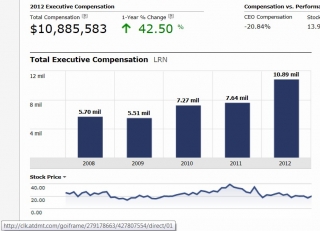K12 Incorporated, a for-profit charter business has a track record of poor academic performance, misleading investors, and deliberately telling teachers to “delete bad grades.” Now, as many Illinois school districts are struggling with shrinking budgets, K12 Inc wants to milk our schools of $8,000 – $11,000 per pupil with a new, “virtual charter school.” In my first piece on this subject, I listed the public hearings for all 18 schools that K12 Virtual Learning Solutions is targeting in the Chicago Suburbs.
K12 Inc. has a Record of Poor Academic Performance and Deletes Grades to Boost Scores.
When I learned that K12 Inc was trying to get their hand in the pocket books of Aurora taxpayers, I started researching the company. One story by investigative reporter, Phil Williams, with Tennessee Channel 5 News exposes an e-mail from the Tennessee Virtual Academy’s vice principal to middle school teachers titled, “important.” The e-mail reads:
“After … looking at so many failing grades, we need to make some changes before the holidays,” the email begins.
Among the changes: Each teacher “needs to take out the October and September progress [reports]; delete it so that all that is showing is November progress.”
“Does it talk about we need to make changes in curriculum? Does it talk about we need to make changes in our teaching strategy? No,” Rep. Johnson observed. “Those changes we need to make are deleting grades from the computer system.”
In a phone conversation with Rep. Gloria Johnson, a Tennessee lawmaker, I learned that Tennessee, K12 Inc virtual businesses consistently perform in the bottom third of Tennessee schools.
In Colorado, NPR reports that K12 Inc. (Colorado Virtual Academy (COVA)) knowingly used aggressive recruitment strategies that enrolled students who were “not a good fit and would likely drop out.”
In Florida, NPR reports that K12 Inc. has a teacher to student ratio of 1:275. Overwhelmed teachers were not able to keep up or offer students the individual attention they were promised.
The list of complaints about K12 Inc. is endless. You can learn more by visiting the CharterSchoolScandal Blogspot.
K12 Inc. has had Legal Troubles and is Under Investigation in Florida
The Florida Department of Education is investigating K12 Inc. for using non-board certified teachers.
Florida Congresswoman, Corrine Brown is calling for a federal investigation into the on-line business.
K12 Inc also has a problem with their Wall Street investors. The company recently settled a lawsuit and paid $6.75 million for misleading investors about their ability to teach kids.
This article in Education Week talks about the lawsuit. I pulled a small excerpt.
“The lawsuit filed against K12 alleged that the company misled shareholders by overstating its academic performance, and by not providing accurate information about student-to-teacher ratios and how students are recruited. The lead plaintiff currently listed in court documents is the Arkansas Teacher Retirement System. As a publicly traded company, K12 is required to answer to shareholders, as well as to the U.S. Securities and Exchange Commission. “
K12 Inc. is a Business, not a School
K12 Inc. is traded as LRN on the New York Stock Exchange (NYSE). They have a business model that uses intense marketing and lobbying strategies to give them access to public school dollars. Over the past six years K12 Inc has spent over $36,000 from their political PAC to buy access to at least 37 Illinois lawmakers. Like every Wall Street firm, they over-pay their CEO, Ron Packard and other executives while underpaying teachers that may or may not actually have a teaching certificate.
K12 Inc. reduces brick and mortar costs by using a “virtual classroom.” This formula has proven to be profitable for K12, but test scores and education outcomes are in serious question. The chart illustrates K12’s executive compensation.
What does this mean for parents and school districts? It means that your education dollars are not going into the classroom. Instead they are going to Wall Street and K12’s CEO, Ron Packard. Those taxpayers who are concerned about high administrative pay in Illinois schools should be outraged at Packard’s compensation package. He made $5 million in 2011 and $3.9 million in 2012. Students enrolled in Packard’s virtual learning business scored at the bottom of their class. Is this what public education critics mean when they say “pay for performance?”
The bottom line here is that the K12 Inc. business model is not working in any of the states where they do business. Why would we want them in Illinois?
Tags: charter school, COVA, Illinois General Assembly, K12 Inc, Northern Illinois Jobs with Justice, privatization, Rep. Gloria Johnson, ron packard, virtual, virtual charter school fox river valley


